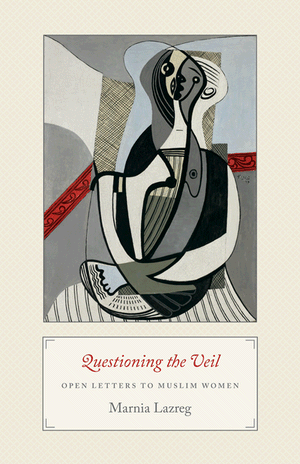
[Editor’s note: Marnia Lazreg’s Questioning the Veil: Open Letters to Muslim Women (Princeton: Princeton University Press, 2009) is a refreshing unveiling of the long debated arguments on the use of some sort of “veil” in Muslim societies. These letters, concise and impassioned arguments in essay format, are for all to read. Modesty? Protection against sexual harassment? Newly formatted cultural identity? Conviction and Piety? Lazreg draws on her own upbringing in Algeria and research as a sociologist to frame her conviction of why Muslim women should not wear the veil. No one interested in the ongoing discussion should fail to read her important contribution. I provide here a brief excerpt from her Introduction.]
I do not approach veiling from the perspective of the struggle between “tradition” and “modernity,” which purportedly women resolve by opting for the veil, as a number of studies have claimed. New styles of veiling are less confining to a woman’s ability to move about than old ones, and a number of veiled women throughout the Muslim world have been carrying out their professional activities side by side with men in their workplaces. Nor do I consider wearing a veil at work as ushering in a new form of “modernity.” Furthermore, I do not intend to characterize veiling as representing women’s “alienation,” “enslavement,” or “subjugation” to cultural norms. Such characterizations are unhelpful as they can easily be applied to our postmodern condition, marked as it is by a retreat from a meaningfully shared human experience and the flaunting of privatized forms of consciousness, which result in conceptions of women that are as detrimental to women’s integrity as the veil might be. I instead approach veiling from an existential-philosophical standpoint that peels away the justifications that women who wear it or intend to wear it usually invoke. This is a delicte endeavor as the risk is great that a woman’s rationale for wearing a veil might be discounted as a form of false consciousness, and her agency dismissed as illusory. As a social scientist. I cannot deny women’s agency or substitute mine for theirs on grounds that I am more equipped to make sense of their motivations than they are. By the same token, mystifying rationalizations are not necessarily expressions of false consciousness or “agency.” However, agency is not a free-floating capacity independent of the social framework within which it expressed itself; neither is it above questioning. At the same time, veiling involves me as a woman who grew up with relatives, neighbors, and friends who wore, or still wear, a veil. Veiling is existentially familiar to me; it has been part of my life even though I do not and will not wear a veil. Because in the popular imagination, in the Muslim world as well as int he “West,” veiling has come to represent the essence of Islam, little space has been made in which this practice could be examined outside the framework of religion, or for its potentially deleterious psychological effects.
Excerpt from Marnia Lazreg, Questioning the Veil: Open Letters to Muslim Women (Princeton: Princeton University Press, 2009), pp. 9-10.